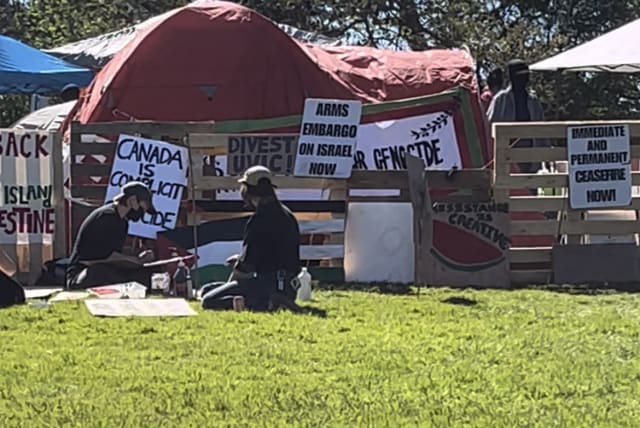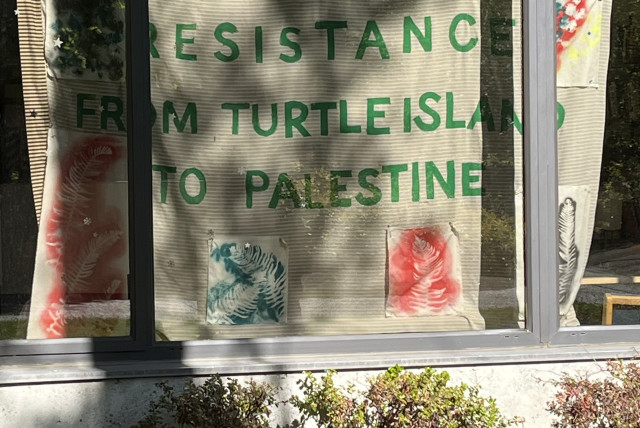A talk with activists from University of Victoria's protest encampment

Pro-Palestinian activists establish encampment at University of Victoria, demanding divestment from Israel, echoing similar movements and advocating for broader liberation causes.
VICTORIA, Canada — At the heart of the wide, verdant landscapes of the University of Victoria campus in British Columbia, Canada, stood a fortress. The walls were made of interconnected wooden pallets scrounged from across the campus, repurposed and redressed with pro-Palestinian messages.
Banners, emblems, and Palestinian flags were erected along the rampart walls. The barriers protected a settlement of canopies, tents, and tables. Erected on Wednesday, the University of Victoria (UVic) had become host to yet another encampment in emulation of the occupation of the Columbia University campus, seeking to force the administration to adopt boycott, divestment, and sanction policies.
The activists did not believe that the encampment movement would die out with the crackdown on the progenitor settlement at Columbia and that the “journey,” as they called it, still had a long way to go.
As much as the structure itself, the activist contingent that manned the fortress stood out on the campus.
Almost all of them covered their faces with surgical masks, vestiges of the coronavirus pandemic. Some seemed to wish to use the masks to conceal their identities, but working in the warm sun with only one security guard a hundred meters away – who was also looking in the opposite direction – it seemed clear that many were still wearing their masks to protect themselves against COVID-19. Many of the protesters wore black-and-white Palestinian or red Jordanian keffiyehs, either as further concealment of identity or as a scarf.
Anti-Israel activists, according to what encampment spokespeople described, were divided according to their area of expertise and assigned designated roles. Some members served as security. Others were seen acting as those responsible for resource collection and the building of the defenses.
On Thursday, the activists had continued to gather wooden pallets to add to the settlement’s defensive walls.
Others seemed to be in charge of propaganda, decorating signs and pallets, which drew in curious passing students who wanted to know why such a structure was established in the middle of their university. There seemed to have been at least one activist who had devoted themselves to training other members, as during a conversation with their spokespeople, a person called on a loudspeaker to say that there was an impending session on “de-escalation” procedures.
The activists were almost universally wary of outsiders. The entrance to the compound had a check-post with a sign that demanded that visitors “check in here.” Rudimentary background checks seemed to be conducted, but people also seemed eager to share their mission and message with the media.
Divestment and ceasefire calls
Sitting on the grass in front of the encampment, representatives of the encampment explained to The Jerusalem Post that they were part of a liberation movement for the Palestinian people, seeking to stop what they believed was a genocide and their institution’s complicity with Israel’s actions.
Like other encampments, they were calling for divestment from any companies or entities that had ties with Israel, and an immediate, permanent ceasefire.
They said they did not have any unique demands particular to the UVic arena, and when it came to the question of any particular Israel-associated elements that the Canadian university had to divest from, they couldn’t name any particular investments but assured that these existed.
IN NOVEMBER, UVic’s Students in Solidarity with Palestine posted on Instagram that the university invested in Dassault Systemes, Cisco Systems, Siemens, Amphenol, BlackRock, the Royal Bank of Canada, Scotiabank, and the Bank of Montreal, organizations that, for the most part, only have indirect business affiliations with Israeli actors through third-party connections or are associated with civilian enterprises alone.
The group also called to boycott Starbucks on campus because of former CEO Howard Schultz’s Zionism and the company’s lawsuit against Starbucks Workers United over a social media post that proclaimed “solidarity with Palestine” merely two days after the October 7 massacre.
Despite the lack of clarity of the spokespeople and activists who manned the encampment over the tangential, residual connections to Israel and its military, one of the banners on the barrier declared, “UVic funds the bombing of all schools in Gaza.”
When asked what was meant by their demands for a ceasefire, a student explained that it entailed not only a cessation of Israeli hostilities against Gaza but an arms embargo and broader BDS action against Israel.
UVIC ISSUED a statement on Thursday claiming that it had “not yet received any direct communication from participants” but was “hopeful that we can continue the productive dialogue we have begun on the topic of divestment.”
The activists rejected the idea that the administration was awaiting contact from the encampment, assuring that they had been making demands since October and that the administration was well aware of these.
While they cast the administration as an antagonistic force in their movement, they also noted that they had been visited and received much support from faculty and staff.
Although UVic’s statement said that erecting tents and temporary structures was prohibited, it “actively supports peaceful demonstrations on our campus and the right to freedom of expression.”
“We are taking a calm and thoughtful approach to this demonstration and will work to minimize disruptions,” UVic said on Wednesday. “Out of an abundance of caution, campus security may be monitoring access to buildings near the demonstration and may ask people for information prior to entering these buildings. Campus security is liaising with Saanich and Oak Bay police to support a safe and inclusive environment.”
The protesters were critical of UVic’s cooperation with the police and said that they were under surveillance by law enforcement, who had stationed forces with night vision systems overnight to watch them from atop a nearby building.
Part of the demonstration’s security precautions were against counter-protests, but they also said that only a handful of pro-Israel students had appeared to challenge them.
One of the pro-Palestinian activists stated that he would “rather not say” what he thought about the Hamas attack on October 7.
The student's broader liberation movement included a myriad of causes, with several transgender students visiting the encampment, and one sign in a nearby building declaring allegiance to "indigenous feminist resistance from Turtle Island (North America) to Palestine."
When asked about a banner that read "From the [Jordan] River to the Salish Sea," an activist representative explained that they were seeking "land back" across North America to the Levant. The activists seemed not to believe that these demands for indigenous Canadian lands could be met by the Liberal government, with a sign on the barrier that said: "Down with genocide [Prime Minister] Justin [Trudeau]."
The activists believe that the securing of land will happen soon, though one spokesperson noted that he may be over-optimistic. Even so, at UVic, they too modified the slogan to chant "From the river to the sea, Palestine is almost free." They did not believe that the encampment movement would die out with the crackdown on the progenitor settlement at Columbia and that the "journey," as they called it, still had a long way to go.
Jerusalem Post Store
`; document.getElementById("linkPremium").innerHTML = cont; var divWithLink = document.getElementById("premium-link"); if (divWithLink !== null && divWithLink !== 'undefined') { divWithLink.style.border = "solid 1px #cb0f3e"; divWithLink.style.textAlign = "center"; divWithLink.style.marginBottom = "15px"; divWithLink.style.marginTop = "15px"; divWithLink.style.width = "100%"; divWithLink.style.backgroundColor = "#122952"; divWithLink.style.color = "#ffffff"; divWithLink.style.lineHeight = "1.5"; } } (function (v, i) { });

